The puppies were born in the injection room of an overdose prevention site on East Hastings.
The day they were born, Lorna Bird knew something was off with her dog, Joy, who is part Havanese, schnauzer and Scottish terrier.
Joy was panting heavily and breathing through her teeth, said Bird, who is the president of the Vancouver Area Network of Drug Users, a non-profit dedicated to improving the lives of drug users. “She was like hthh, hthh! I didn’t want to take her home like that,” she said.
VANDU is headquartered in what used to be a bank in the Downtown Eastside. Joy was resting in its supervised injection room, a crucial service VANDU offers in a province where 2,224 people died last year from using street drugs contaminated with fatal doses of synthetic opioids.
It was a hot summer night, and Bird ended up falling asleep while waiting for Joy to recover. The next thing she knew, Hugh, one of the injection room’s supervisors, woke her with the announcement: “Joy had some pups!”
There were four in total: Guess, Houdini, Choo Choo and another that was dognapped two days after birth. Bird later heard the fourth puppy had unfortunately died, probably as a result of having been cut off from its mother’s milk.
For Guess, her unconventional birthplace led her to participate in the work of the activists around her: saving lives in the middle of a provincial health emergency.
As a pup, she learned to bark if she spotted an overdose.
It started at home. Bird sold Guess to her colleague Laura Shaver, who’s on VANDU’s board and is the president of the BC Association of People on Methadone.
Shaver and her fiancée Martin Steward chose the name as a joke.
“What’s her name?” people would ask.
“Guess,” they’d reply.
And people would begin guessing.
One night at home when Guess was still a puppy, Steward was using drugs and had an overdose.
“It wasn’t a full overdose,” said Shaver, “but his breathing was really, really bad. I was sleeping, and Guess stuck her tongue up my nose and started barking.”
“She saved my life,” said Steward on a recent afternoon while helping Guess put on a sweater with polka dots and a skull.
Steward has colon cancer, among other health issues. “If it wasn’t for her, I’d be a lazy bones. She’s doing me a favour when we go for long walks,” he said.
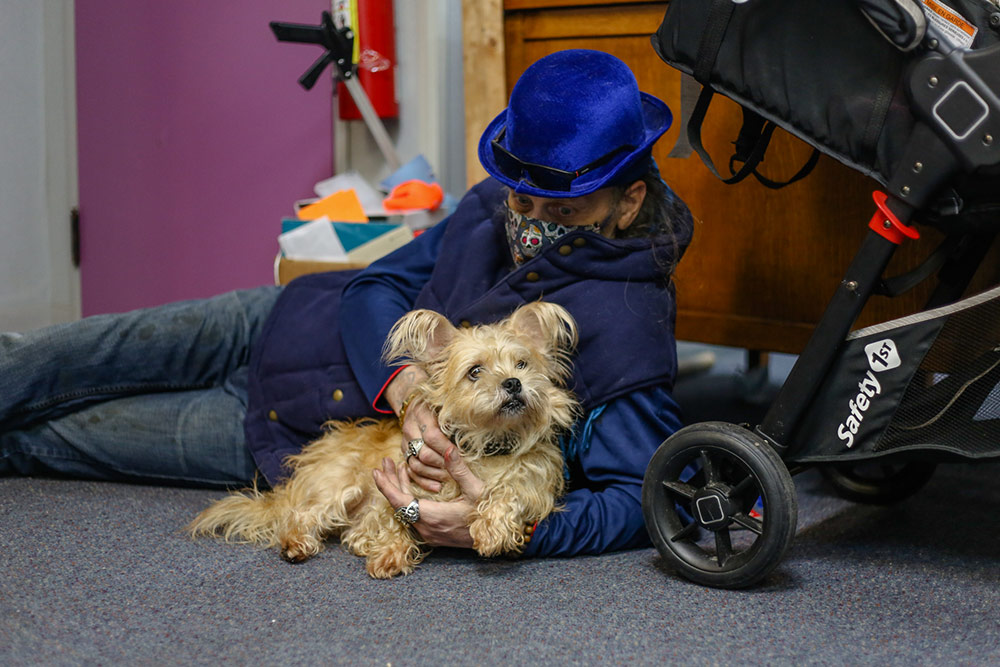
Shaver usually brings Guess with her to work, and that’s where she sounded the alarm a second time.
“My best friend has a bullet in his brain from an old injury,” explained Shaver. “So one side of his body is paralyzed and he has a prosthetic eye as well, which means that one of his eyes, no matter what, is always open.
“I was sitting across the room doing my work, and Guess, she came over to me and started scratching and nipping at my leg and barking. I look over, and my friend’s starting to fall out of his chair — he’s overdosing.”
From then on, Guess became quick to alert people nearby about the need for naloxone, which counters opioid overdoses, if she spotted anyone keeling over or with trouble breathing, especially in VANDU’s injection room. Guess even barks if she notices someone in a deep sleep, worried if they might be in a critical condition.
“We didn’t teach her this,” said Shaver. “She just pays attention.”
Guess’s mother Joy is the same way.
“I got Joy at three months old,” said Bird. “There was an overdose in the injection room, and she saw it. After that, whenever she sees somebody go down or lay on the floor, she starts barking.”
Though services for drug users in Vancouver are largely concentrated in the Downtown Eastside, this isn’t just a crisis in the neighbourhood. People are dying from toxic drug deaths all over B.C., with some of the highest death rates last year in the Thompson Cariboo region and the province’s interior.
VANDU began running its supervised drug consumption site in 2011. The province wouldn’t declare the toxic street drugs crisis an emergency until 2016.
“We haven’t had any fatalities,” said Bird, evidence that supervised drug consumption sites, with naloxone on hand to counter opioid overdoses, are critical.
Despite its lack of green space compared to other parts of Vancouver, the Downtown Eastside is home to a lot of pets, dogs, cats and even rabbits and rats.
In a neighbourhood where many residents live with poverty, illness and isolation, pets like Joy and Guess offer a lot of warmth and love. Requiring care and walks, dogs in particular give a sense of routine to the owners who need it.
“I live by myself,” said Bird, who is 65. “I bought Joy for $500. It was the best $500 I ever spent.”
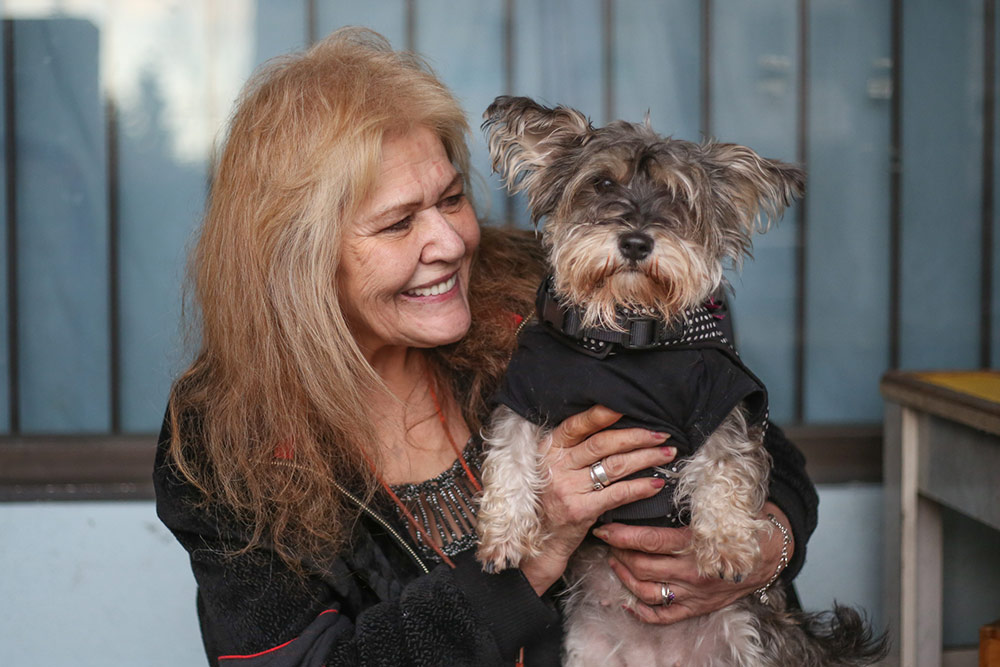
Aside from the VANDU dogs, there’s at least one dog at another overdose prevention site in the neighbourhood that alerts to overdoses. And yet another site has a certified therapy dog who visits to bring calm and cheer to clients.
On the days the mother and daughter dogs of VANDU show up to work, you might spot them rolling down East Hastings on wheels. Bird rides a scooter, and Joy sits by her legs. Shaver and Steward sometimes push Guess in a baby stroller.
The other dogs in the family visit the office too. As does Conrad, Guess’s father and a local “bad boy,” who mated with Joy in 2019 when she was less than a year old.
Later, Conrad mated with his own daughter Houdini, who gave birth to a litter of six at the office. “Houdini was screaming,” said Bird of the day of the birth. “There was no medication, no doctors, no nothing. Just me having learned from shows on TV.”
Bird helped pull out one of the pups that was born feet first. And when Houdini wasn’t able to urinate, Bird remembered watching an episode that taught her to rub the dog’s stomach, an action called “expressing the bladder.”
The dogs have attended numerous meetings with their owners at VANDU, ranging from meetings on safe supply regulation to a drinkers’ support group. Their presence has also changed the habits of some of VANDU’s clients.
“She’s made people much more respectful about keeping their drugs and drug paraphernalia in their own space,” said Shaver.
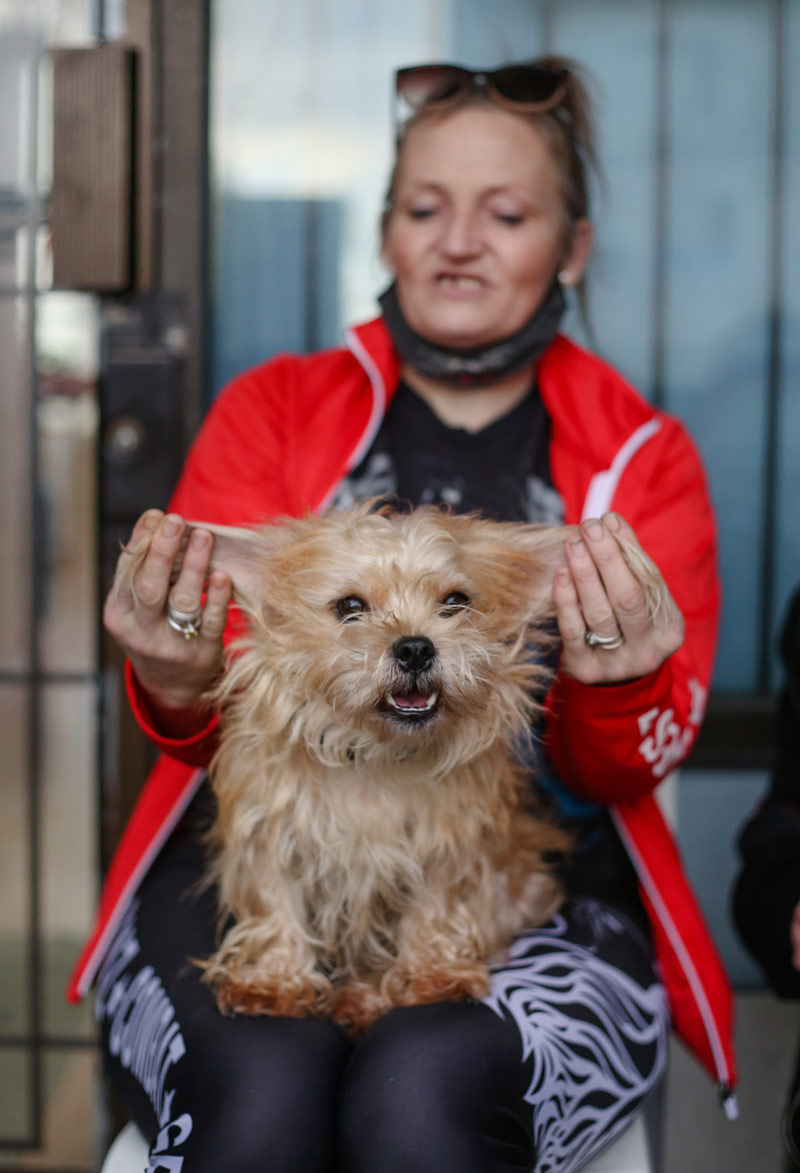
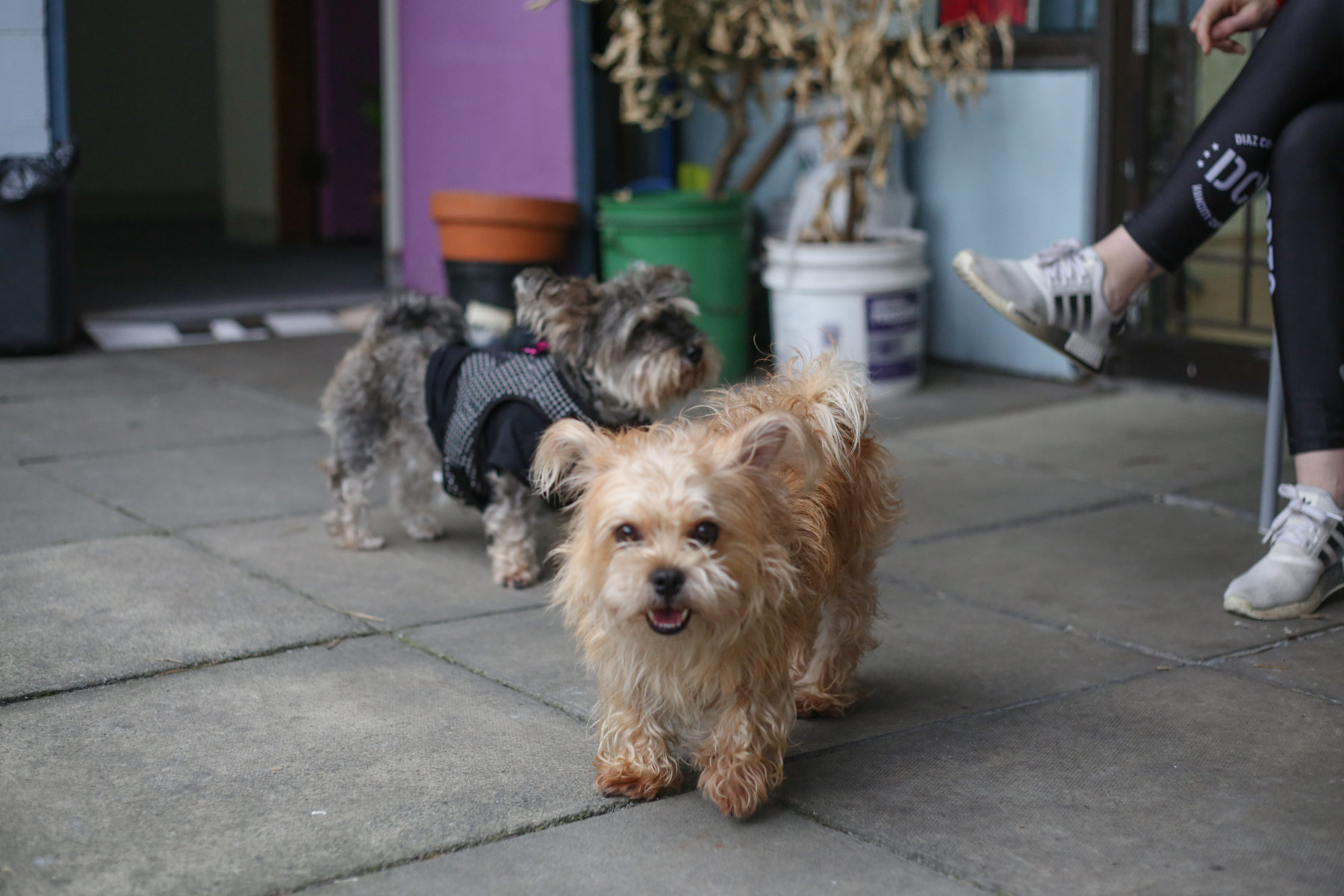
On a recent Wednesday afternoon, Bird and Shaver enjoy a cigarette on VANDU’s patio while the two dogs yip and yap in the sun.
Bird would love for Joy to become a certified service dog, she says, but “can’t afford to put her through that.”
Still, the two dogs, born in the midst of an emergency that’s claimed the lives of thousands of British Columbians, have learned to do their part with their barks, watchful eyes and lively play.
“Guess gets some of the biggest, grumpiest people — who some may call ‘scary men’ — to get down on their knees to play with her,” said Shaver. “She brings people out. She just wants to make them happy.” ![]()
Read more: Health



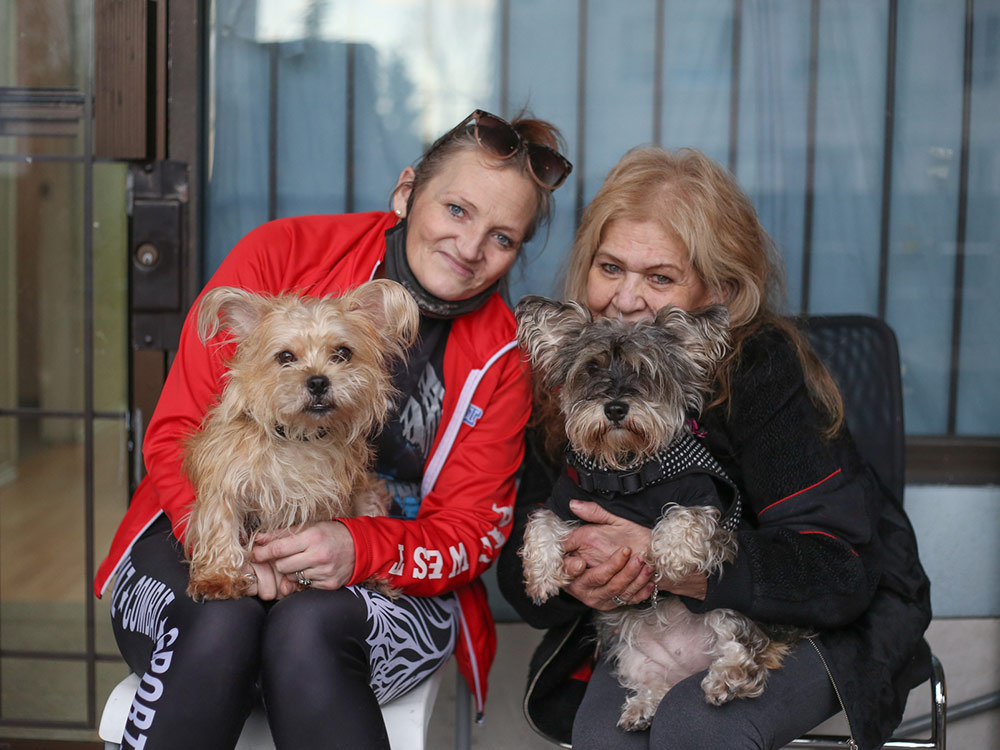












Tyee Commenting Guidelines
Comments that violate guidelines risk being deleted, and violations may result in a temporary or permanent user ban. Maintain the spirit of good conversation to stay in the discussion.
*Please note The Tyee is not a forum for spreading misinformation about COVID-19, denying its existence or minimizing its risk to public health.
Do:
Do not: